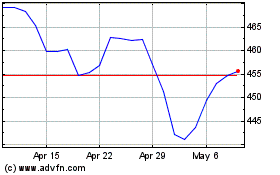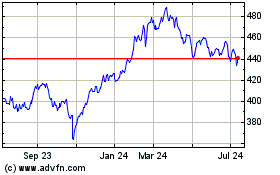Mastercard, Visa Cut Europe Merchant Fees -- WSJ
December 05 2018 - 3:02AM
Dow Jones News
By Allison Prang
This article is being republished as part of our daily
reproduction of WSJ.com articles that also appeared in the U.S.
print edition of The Wall Street Journal (December 5, 2018).
European Union regulators said Tuesday Mastercard Inc. and Visa
Inc. have agreed to lower fees assessed to merchants when they
accept debit or credit cards issued outside the region, a move that
comes after merchants alleged that networks and banks colluded to
inflate those fees.
The European Commission said both companies made offers to lower
these fees -- known as interregional interchange fees -- by a
minimum of 40%. The commission, which has asked for feedback on
those proposals, said the fees are applied to payments made in the
EU and three other European countries with cards issued outside of
the region.
Card networks like Visa and Mastercard set interchange fees. But
it is the banks that profit from them because merchants pay the
banks when customers pay with their cards.
That means that getting lower fees from European purchases could
have deep implications for U.S. banks. In recent years, they have
focused their credit-card businesses on more affluent customers,
many of whom travel and spend outside the U.S.
The commission is worried that the fees could raise prices for
companies in Europe, potentially driving up prices for consumer
goods and services.
Credit-card companies have been locked in disagreements over
fees charged to merchants with officials in the U.S. and Europe for
years.
The European Commission raised concerns about Mastercard's
interchange fee practices for cross-border transactions in 2007 and
it released a statement in 2009 objecting to Visa's interchange fee
practices.
More than 400 U.K. merchants also have sued Visa since 2013
seeking damages for certain interchange fees, Visa said in its
annual filing. As of Sept. 30, Visa said it had reached settlements
with more than 75 of those merchants.
In the U.S., Visa and Mastercard were part of a group of firms
that agreed to a $6.2 billion settlement with merchants related to
card fees.
Under the proposals, interregional interchange fees would be
capped at 0.2% of the transaction value for debit cards and 0.3%
for credit cards when carried out in person. Fees for online
purchases would be capped at 1.15% for debit cards and 1.5% for
credit cards.
Transactions where a card isn't present -- or purchases made
online -- usually have higher rates because they can be riskier and
are more complicated, a Visa spokeswoman said.
The European Commission plans to test these proposals in the
market before they become permanent, and the new rates would go
into effect six months after that decision is made. The commitments
would be effective for 5 1/2 years.
Mastercard said Tuesday in a securities filing that it took the
action to avoid prolonged litigation. It expects to record a
roughly $650 million charge in the fourth quarter in connection
with the matter.
Mastercard said it isn't admitting that its practices violated
EU competition rules.
In recent Tuesday trading, shares of Mastercard dropped more
than 3% and Visa fell nearly 3%.
--AnnaMaria Andriotis contributed to this article.
Corrections & Amplifications Under the proposals
interregional interchange fees would be capped at 0.2% of the
transaction value for debit cards and 0.3% for credit cards when
carried out in person. Fees for online purchases would be capped at
1.15% for debit cards and 1.5% for credit cards. An earlier version
of this article incorrectly stated those percentages would be the
fees. (Dec. 4, 2018)
Write to Allison Prang at allison.prang@wsj.com
(END) Dow Jones Newswires
December 05, 2018 02:47 ET (07:47 GMT)
Copyright (c) 2018 Dow Jones & Company, Inc.
MasterCard (NYSE:MA)
Historical Stock Chart
From Mar 2024 to Apr 2024

MasterCard (NYSE:MA)
Historical Stock Chart
From Apr 2023 to Apr 2024
